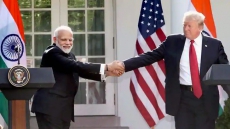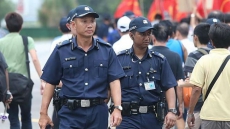Pakistan's top civil and military leadership on Wednesday decided to expel Indian High Commissioner Ajay Bisaria and suspend bilateral trade with India in the wake of New Delhi's move of revoking special status for Jammu and Kashmir.
The decision was taken at a meeting of National Security Committee (NSC) - the second within a week - presided over by Prime Minister Imran Khan to review the situation following the Indian government's move on Kashmir.
"We will call back our ambassador from Delhi and send back their envoy," Foreign Minister Shah Mehmood Qureshi separately announced in televised comments.
He spoke as the government released a statement following the NSC meeting, declaring that Pakistan will suspend trade with India in a "downgrading of diplomatic ties", review bilateral arrangements, take the matter to the UN and observe Pakistan's Independence Day on August 14 in solidarity with Kashmiris.
Prime Minister Imran Khan chaired a meeting of NSC.
— Govt of Pakistan (@pid_gov) August 7, 2019
Prime Minister directed that all diplomatic channels be activated to expose the brutal Indian racist regime and human rights violations.
He directed Armed Forces to continue vigilance.#StandwithKashmir #Pakistan pic.twitter.com/3nqjcrwUQ3
Late in the evening, Pakistan ordered some changes in Indian flights going through its airspace. India, on its part, issued security alert at 19 airports and deployed additional security personnel apart from regular deployment at airports.
India has been conveyed the decision, the Pakistan Foreign Office said.
In a formal statement, the Foreign Office spokesperson said: "Pursuant to the decision of the National Security Committee today, the Government of India has been told to withdraw its High Commissioner to Pakistan.
"The Indian Government has also been informed that Pakistan will not be sending its High Commissioner-designate (Moin ul-Haq) to India."
Prime Minister Imran Khan chaired a meeting of NSC at Prime Minister’s Office. Committee discussed situation arising out of unilateral & illegal actions by Indian govt, situation inside Indian Occupied J&K and along LOC.
— Govt of Pakistan (@pid_gov) August 7, 2019
The Committee decided to take following actions: pic.twitter.com/2wVySU4IxP
The statement released after the NSC meeting said: "The Prime Minister directed that all diplomatic channels be activated to expose brutal Indian racist regime, design and human rights violations."
The meeting was attended by Defence Minister Pervez Khattak, Foreign Minister Qureshi, Chairman, Joint Chiefs of Staff Committee, General Zubair Hayat, Army chief, General Qamar Bajwa, Navy chief, Admiral Zafar Mehmood Abbasi, Air Force chief, Air Chief Marshal Mujahid Anwar Khan, ISI Director-General Lt Gen Faiz Hameed and other officials.
"Independence Day this August 14 to be observed in solidarity with brave Kashmiris and their just struggle for their right of self-determination," the statement read. "August 15 will be observed as Black Day," the statement added.
A joint parliamentary session also passed a resolution condemning New Delhi's "unilateral move".
The resolution was presented by Kashmir Committee Chairman Syed Fakhar Imam and was passed unanimously, Dawn newspaper reported.
It condemned India's "illegal, unilateral, reckless and coercive attempt to alter the disputed status of Indian occupied Kashmir as enshrined in the UN Security Council (UNSC) resolutions".
The resolution slammed "other regressive measures to change Kashmir's demographic structure as well as the recent surge in unprovoked firing and shelling on unarmed civilian population across the Line of Control and use of cluster bombs by Indian forces in Azad Jammu and Kashmir".
The joint session also denounced the "deployment of additional troops and atrocities in Indian occupied Jammu and Kashmir and other recent developments".
It demanded that the communications blackout in "occupied Kashmir be lifted, the prolonged curfew regime be ended" and asked Indian to "honour its own commitment to the UNSC, Kashmiris and the international community".
The resolution called upon the UNSC to take cognizance of the matter and the UN Human Rights Council to constitute a Commission of Inquiry.
Qureshi while addressing the session said that "there are voices from within India itself which are crying foul" over New Delhi's move.
He claimed said that it had always been "India's diplomatic agenda to bury the issue of Kashmir".
"Sometimes they would say it is a bilateral issue, sometimes they would say we are not at all ready for a third-party facilitation, other times they would say mediation is completely unacceptable. This has always been their policy.
"And it has been their effort to hide the issue from the world. Today, I want to inform the parliament that with this move, India itself has internationalized the matter.
"Today in the whole world, the Kashmir issue is being discussed and the struggle of Kashmiris a point of debate. And the concern we have seen internationally is hidden from no one," said the Minister.
Minister for Human Rights Shireen Mazari said that India's actions were tantamount to "war crimes done by a rogue government".
Former President and the Pakistan Peoples Party (PPP) leader Asif Ali Zardari said the Indian government's decision was as serious as the "East Pakistan tragedy".
"The Kashmir issue is the second major incident after the separation of East Pakistan. The Pakistan Peoples Party was formed for the cause of Kashmir. Zulfiqar Ali Bhutto, after negotiations, took back the land from (former Indian Prime Minister) Indira Gandhi," Zardari was quoted as saying by Geo News.
"India will be divided because of (Prime Minister Narendra) Modi's thinking. Muslims of India and occupied Kashmir now understand the two-nation theory of Quaid-e-Azam," Zardari said during the joint session.
On Tuesday, Imran Khan, addressing a joint session of the National Assembly, had said that Pulwama-like attacks can follow the revocation of the special status for Jammu and Kashmir, which can lead to a war between India and Pakistan.
"I can already predict this will happen. They will attempt to place the blame on us again. They may strike us again, and we will strike back," the cricketer-turned-politician told the Parliament.
Slamming the repeal of special status to Jammu and Kashmir, Khan had called on the world to raise its voice "for the people of Indian-administered Kashmir".
PAKISTAN'S DECISION TO EXPEL INDIAN ENVOY 'AN ACT OF DESPERATION'
The diplomatic community in India has termed Pakistan's decision to expel the Indian ambassador from Islamabad as an "act of desperation".
On Wednesday, Pakistan expelled Ajay Bisaria, the Indian ambassador to the country, from Islamabad. Pakistan Foreign Minister Shah Mehmood Qureshi also announced that their Indian counterpart in New Delhi will be called back.
Though Pakistan does not have a high-commissioner to India at present, the announcement means that diplomat Moin-ul-Haq who was slated to take over the position will no longer take up the post. The move is a fall-out of India's recent decision to withdraw special category status to J&K.
Dilip Sinha, former permanent representative of India to the United Nations, told IANS the move only makes a mockery of Imran Khan's statement that he wants to have a political dialogue with India.
"Pakistan has no locus standi in the matter or of telling India on how to run its own affairs in J&K. It shows his shallowness of understanding of the matter. Pakistan has always treated its own occupied area in Kashmir, what it calls the Azad Jammu Kashmir or Northern Areas, as a colony. Over the years, Pakistan never consulted India before taking political decisions in PoK," said Sinha.
Sinha said in 1970, Pakistan merged all princely states in the Northern Areas, that is, Gilgit-Baltistan, and formed a new district through a Presidential order. Former Pakistani president, Zia-ul-Haq, had extended the imposition of martial law in the country to PoK too. In 1980, Pakistan changed the name of the area to Northern Areas. Ten years ago, they again changed the name of the area to Gilgit-Baltistan.
"Did Pakistan consult India before taking these decisions? In 1963, General Ayub Khan and Bhutto signed a treaty with China giving it away 5,000 sqm of land in the former state of J&K. This area, the Shaksgom area, was ceded by Pakistan to China. If J&K is a disputed territory, as has been claimed by Pakistan, how did it cede a part of the territory to China?" asked Sinha.
Former Indian Ambassador to Pakistan G Parthasarathy said the decision by Pakistan to downgrade diplomatic ties with India reeks of its obvious frustration at getting no international support over J&K.
"Recalling of ambassadors is not a new phenomenon. India had recalled its ambassadors to Islamabad following the Kargil incident and again after the terrorist attack on the Parliament. However, the present action by Imran Khan is one of a beleaguered and desperate head of government who has been taken aback at our foreign policies and the ability of our economy to do well," Parthasarathy told IANS.
Jaimini Bhagwati, former Indian ambassador to the UK, said Pakistan's decision to downgrade diplomatic relationships with India does not make any sense for the mutual relationship between the two countries.
"Pakistan should have conveyed its concerns over the developments regarding J&K through all means including diplomatic channels. Even when relationships between the two countries are difficult, they should keep talking to each other," said Bhagwati.


